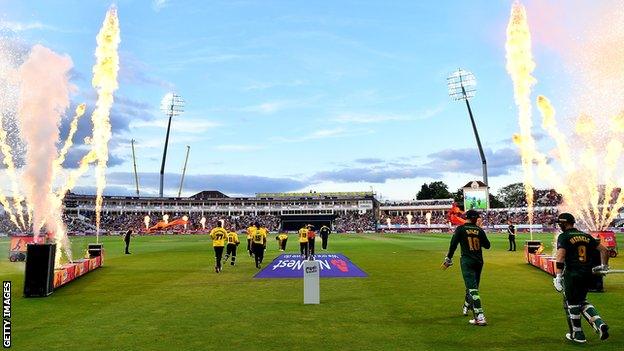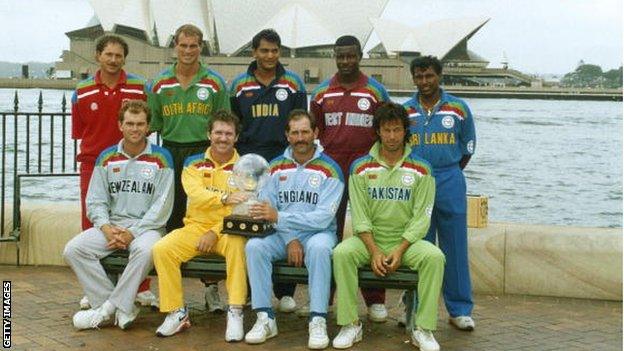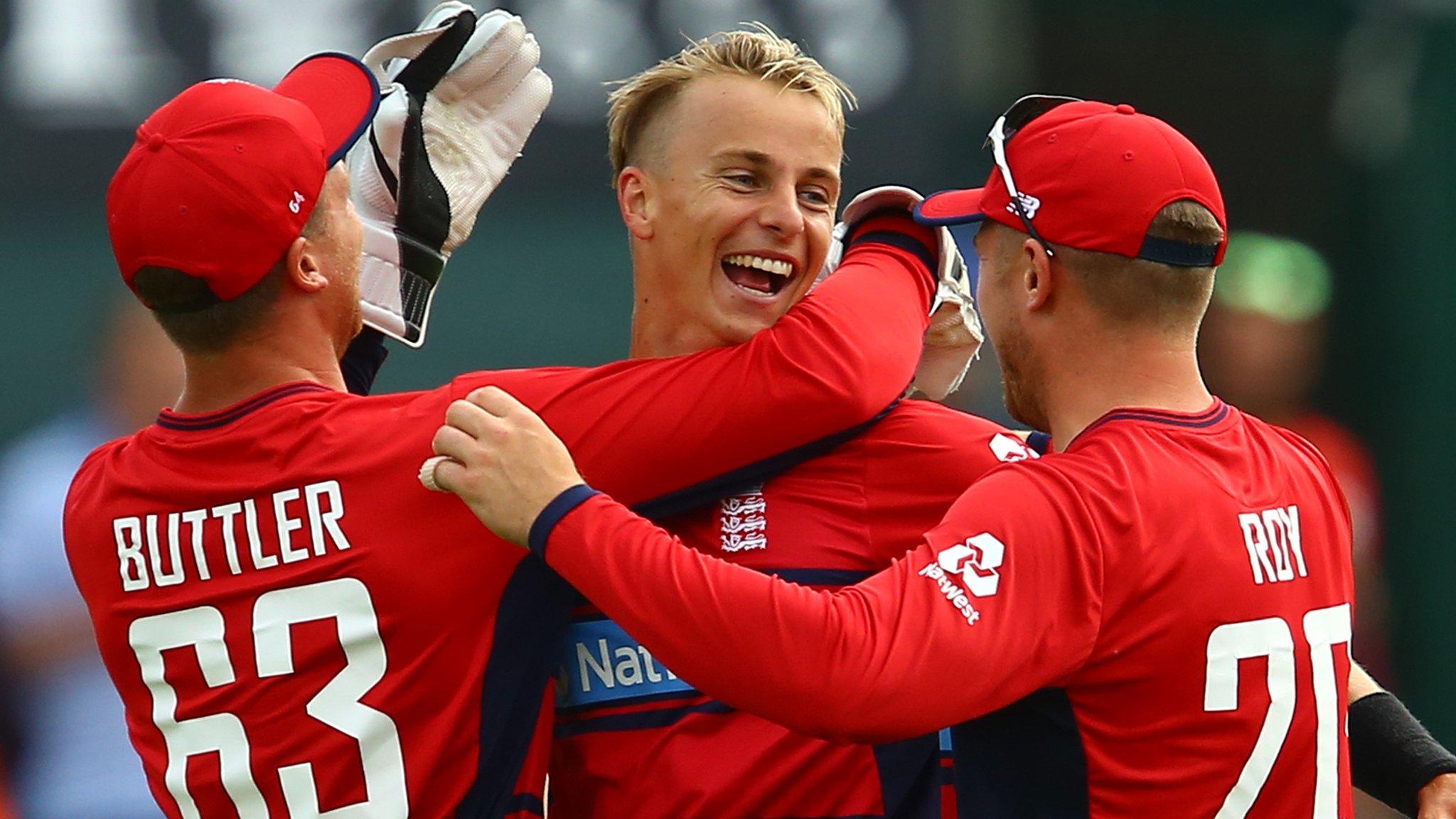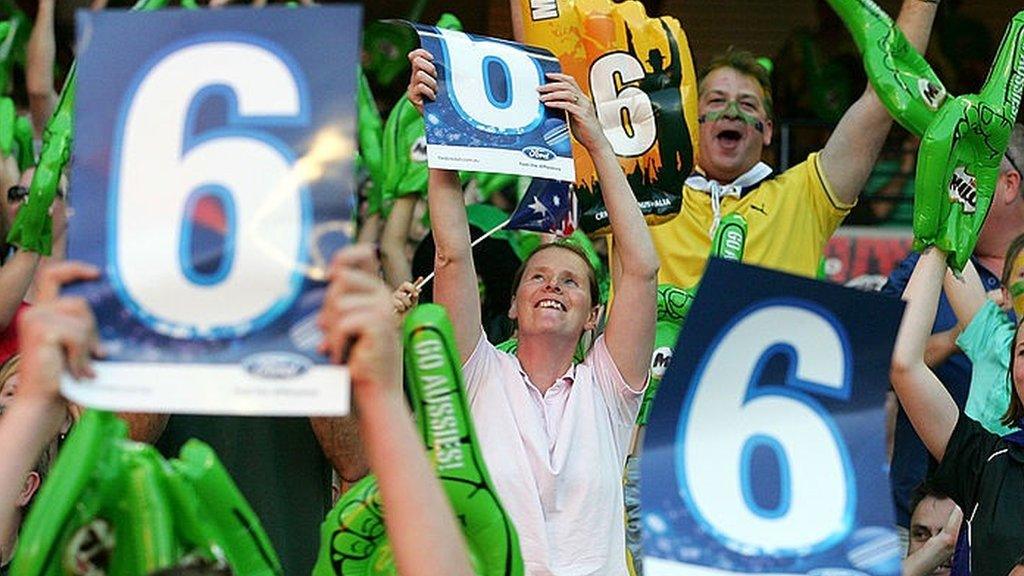ECB holds talks to introduce 100-ball format to new competition
- Published
- comments

Notts Outlaws won the 2017 T20 Blast - the ECB introduced the original Twenty20 Cup in 2003
The England and Wales Cricket Board wants to introduce an innovative '100 balls' format into its new eight-team, city-based tournament.
The concept could see innings consist of 15 traditional six-ball overs, and a final 10-ball over.
That would be 20 balls shorter than traditional T20 matches.
Those devising the competition believe a 100-ball 'countdown' would attract new audiences and be popular with broadcasters.
The proposed approach was presented by the ECB to the chairmen and chief executives of the first-class counties and MCC on Thursday.
ECB's chief executive officer Tom Harrison said: "This is a fresh and exciting idea which will appeal to a younger audience and attract new fans to the game."
The new competition's board unanimously supports the development of the 100-ball concept.
Southampton, Birmingham, Leeds, London, Manchester, Cardiff and Nottingham have been selected as venues for the five-week competition, which starts in 2020.
Both Lord's and The Oval will host newly-created teams in the competition with the Ageas Bowl, Edgbaston, Headingley, Old Trafford, the Swalec Stadium and Trent Bridge the other grounds chosen.
The BBC and Sky Sports will broadcast live TV coverage of the new men's and women's domestic tournament each summer from 2020 to 2024.
The new competition will take place alongside the existing T20 Blast which is expected to be unaffected by the proposed format changes.
The ECB believes the concept will help to appeal to families and a more diverse and younger audience, and provide some distinction from the T20 Blast.
It will feature aligned competitions for both men's and women's teams, with the same format and team identities.
The 100-ball concept will now be further developed but it has been welcomed by the broadcasters and player representatives - both men and women - that have been consulted.
A shake-up for cricket?

In the current T20 Blast, the competition's semi-final and finals are played on the same day at Edgbaston
The move would be one of the biggest shake-ups to the game since the introduction of the Twenty20 Cup in 2003, the first professional 20-over competition.
Six-ball overs have been standard in cricket since 1979-80, before which overs had consisted of four, five, six or eight balls at various times.
When the new city-based competition was announced last year, the ECB said it marked "an exciting new era" for cricket in England and Wales and could help the sport be "relevant to a whole new audience".
The ECB's aim is for the competition to compete with the world's biggest T20 tournaments, the Indian Premier League and Australian Big Bash.
Eleven England internationals are currently taking part in this year's IPL, rather than the English County Championship which began last week.
Players can earn huge sums of money in the IPL with England's Ben Stokes sold for a record £1.7m last year.
Last year's event saw television viewership of more than 1.25bn in the host country alone, while broadcaster Star India paid £1.97bn in September for global TV and digital rights in a five-year deal.
How will city-based tournament work?
Eight new teams playing 36 games over a 38-day summer window, with four home games per team
No scheduling overlap with the existing T20 Blast competition
An Indian Premier League-style play-off system to give more incentive for finishing higher up the league
A players' draft, with squads of 15 including three overseas players
Counties guaranteed at least £1.3m each per year
Cricket's landmark changes

Players wore coloured clothing for the first time at a World Cup in 1992
1971: The first one-day international: England play Australia in Melbourne in the first one-day international
1979: World Series Cricket: A breakaway professional competition which is widely credited for the widespread introduction of coloured clothing and day-night cricket
1992: The first coloured clothing World Cup: Coloured clothing is used at an ICC Cricket World Cup for the first time.
1992: The third umpire: Third umpires are introduced to make decisions using TV replays.
2003: T20 cricket: The ECB introduce the first 20-over competition
2008: The decision review system: DRS is trialled for the first time in a Test match between Sri Lanka and India
2015: Day-night Tests: The first day-night Test is played between Australia and New Zealand with a pink ball
Analysis
BBC cricket correspondent Jonathan Agnew
Somehow the ECB has to make the new tournament different to the existing T20 Blast and this countdown from 100 balls is the first innovation.
Whether adjustments like this will attract the new audience the ECB is seeking remains to be seen. At the moment, the interest among existing cricket fans is lukewarm at best.
But the board emphasises that this eight-team city-based competition, some of which will be shown on terrestrial television, is all about fresh faces and families.
For many, the most important aspect to the congested 2020 season will be how the board awards quality time to the County Championship to preserve the performance of the England Test team.
- Published19 April 2018

- Published26 April 2017

- Published30 June 2017

- Published28 March 2017

- Published18 October 2016
